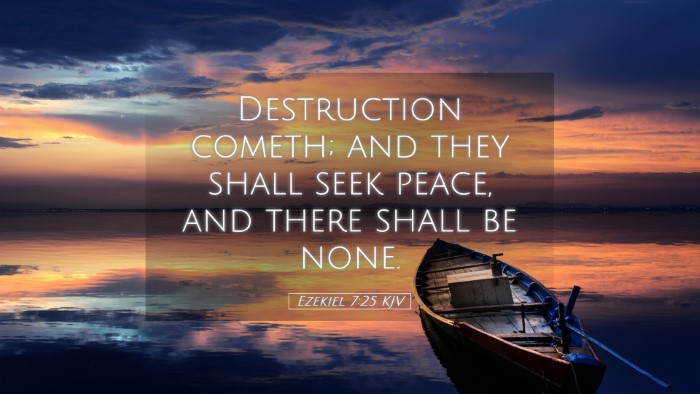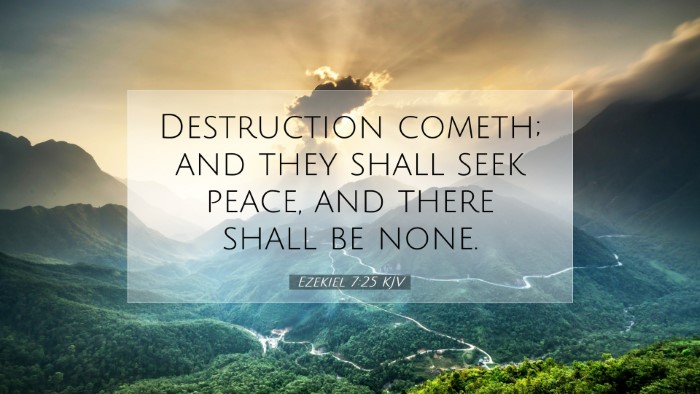Ezekiel 7:25 Commentary
Verse Text: "Destruction cometh; and they shall seek peace, and there shall be none."
Introduction
Ezekiel 7:25 encapsulates a profound message concerning the judgment of God upon Israel, reflecting a time of distress, inevitable destruction, and the absence of peace. The prophet Ezekiel, chosen as a mouthpiece of divine revelation, delivers these sobering words as part of a larger discourse on the impending judgment against the people of Judah. This commentary seeks to draw from the insights of esteemed biblical scholars such as Matthew Henry, Albert Barnes, and Adam Clarke to shed light on the weight of this verse.
Contextual Background
Ezekiel, a priest and prophet, ministered during the Babylonian exile, a period marked by calamity and loss. The book of Ezekiel serves as a judicial declaration against Israel's persistent disobedience and idolatry. Chapter 7, in particular, focuses on the impending calamity that will befall the nation, highlighting the certainty of destruction and the futility of seeking peace in the midst of divine judgment.
Verse Analysis
Destruction Cometh
Matthew Henry notes that the phrase "destruction cometh" signifies a divinely ordained calamity that is irrevocably approaching. This destruction is not arbitrary but is the result of Israel's transgressions. The emphasis is on the certainty of this event, underscoring God's sovereignty in administering justice.
Seeking Peace
Albert Barnes elaborates on the notion of seeking peace, indicating that in times of imminent danger, people often yearn for tranquility and safety. However, the text suggests that such peace will be elusive due to their iniquities. The pursuit of peace without genuine repentance is futile; hence, God's warning serves as a harsh reminder of the consequences of sin.
There Shall Be None
Adam Clarke remarks on the despair echoed in the conclusion of this verse. The stark reality that "there shall be none" reinforces the depth of Israel's plight. Clarke points out that this statement not only reflects physical calamity but also a spiritual desolation where the hope of reconciliation with God is lost. The absence of peace references both external circumstances and the inner turmoil felt by those who once thrived under God's covenant.
Theological Implications
The divine message in Ezekiel 7:25 presents several key theological themes:
- Judgment and Justice: The certainty of destruction is a testament to God's justice. The holiness of God requires that sin be addressed, pointing to the seriousness of Israel’s wrongdoing.
- Human Vulnerability: The longing for peace during times of crisis reveals humanity's intrinsic desire for security. Yet, it also highlights the futility of such aspirations apart from God’s grace.
- Hope and Repentance: Implicit in this passage is a call to repentance. Although the judgment is severe, the possibility of restoration remains contingent upon the people's response to God’s warning.
Application for Today
This verse, while rooted in the historical context of Israel, offers timeless lessons for modern believers:
- Understanding Divine Judgment: Just as Israel faced consequences for their disobedience, the text serves as a reminder of the seriousness of sin and the necessity for believers to align their lives with divine precepts.
- Seeking True Peace: In a world filled with chaos and conflict, the pursuit of peace must be rooted in a relationship with God. True peace is not merely the absence of conflict but the presence of God’s harmony in our lives.
- Repentance as a Pathway: The understanding that peace eludes those who remain in sin encourages believers to seek continual repentance, recognizing God’s invitation to restoration.
Conclusion
Ezekiel 7:25 is a poignant reminder of the consequences of a life lived apart from God. Through the insights gathered from revered commentators, this scripture illuminates not just the historical march towards destruction faced by Israel, but also the modern relevance of God’s truth in our lives today. In acknowledging the bitterness of sin and embracing the call to pursue peace through repentance, believers can find hope in the midst of chaos, rooted in the reconciliation with God offered through Jesus Christ.


